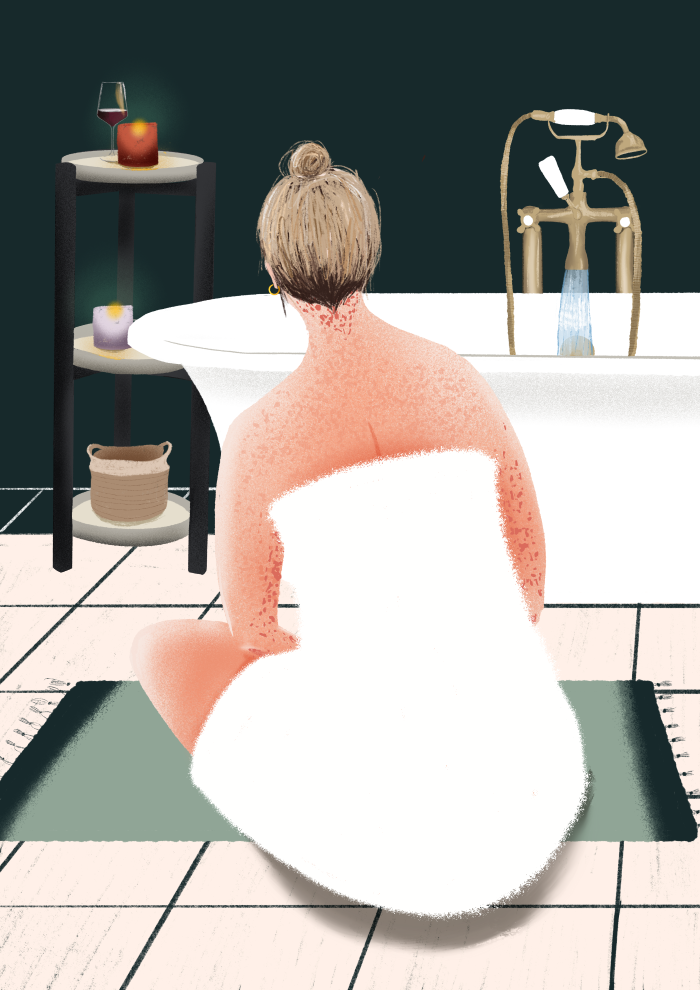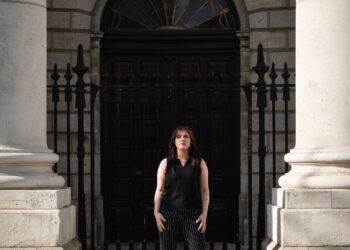In the November issue of Irish Country Magazine, Deputy Editor Niamh Devereux shines a light on the inflammatory autoimmune condition for our health series The Invisible Struggle. Here, she speaks to Zoe Ryan of online awareness platform “Itching to Tell You” in the hopes that she can empower others to trust themselves and seek answers for any health issues they may have
Hi Zoe; thank you for speaking to me about this. You say your psoriasis began at 18. Can you take me through that time, how it first started for you, and how difficult it was to accept?
“It was during my Leaving Cert Year, which for me was a time of great stress. Stress is actually one of the most common triggers for the initial onset of the condition. I used to do after-school study in the dining hall, I’d be writing with one hand and leaning across the table, propping up my head with the other. One day I felt a ridge on the back of my head and started picking it. Within a short space of time, it multiplied and spread across my entire scalp. Whenever my hands were idle, like when watching the television or revising, I would be picking at it. Suddenly I’d see a pile of flakes on my shoulder and have to, as discreetly as I could, brush them off or I’d see the blood under my fingernails and know I’d gone to far. Eventually, I told my parents and an appointment was made with a dermatologist.
“I remember sitting across from the specialist but everything they said after ‘incurable’ is a blur. I could see their mouth moving but the sound got quieter and quieter. All I could think was, they must be wrong. For a long time, I struggled to wrap my head around and accept that something that seemed to have appeared overnight was here to stay. That was definitely down to a lack of understanding and knowledge of the condition, but I’ll admit, back then, I wasn’t interested in knowing more about it, I just wanted it gone.
“Another thing that contributed to my stubbornness and refusal to believe it was incurable was the way in which I was delivered my diagnosis. The specialist’s tone and manner towards me. So devoid of feeling, cold. It’s as if they failed to recognise how devastating the news they were delivering was. I was furious and sought a second opinion. I was happier with how that consultant approached the subject but still for years was I convinced there was a cure out there and I just hadn’t found it yet. I put so much time, effort and hope into chasing the illusive cure. It was only after filming a documentary series on the topic during my masters year, in which I got the chance to speak to treatment providers from different schools of thought and fellow psoriasis warriors, that I started to accept my condition.”

Interestingly, it turns out that this wasn’t something that just happened overnight for you; can you elaborate on this?
“Yes, so I was officially diagnosed when I was 18. At that point, it was unmistakably quite an aggressive form of scalp psoriasis. Looking back on my medical records it’s suspected I may have actually had psoriasis since infancy, in other, less obviously identifiable forms, that were misdiagnosed as similar-looking, skin-related conditions (eczema, athletes’ foot, a shaving irritation) in between periods of remission when the symptoms clear completely.
“Psoriasis commonly first presents during two life stages, teenage to early 20s and 50s – 60s. Psoriasis in children is quite rare, which would explain why it wasn’t on the physicians’ radars. Psoriasis can run in families and in our case it does but interestingly my Dad’s didn’t surface until he was in his 50s, after I had gotten my diagnosis, so the familial link wasn’t made until then. If it had been known Daddy had psoriasis when I was a child, I may have gotten my diagnosis a lot earlier.”
Can you describe the physical symptoms of your psoriasis?
“My scalp has always been the most affected. A layer of scale, which constantly changes in thickness and flakiness, coats my entire scalp. Clusters of plaques seasonally extend past my hairline down onto my forehead, behind my ears, in my ears, down the back of my neck. I also get random patches scattered across my body (no area is off limits) often in the same places as they have been before but occasionally, I experience flares where they will appear in areas they haven’t previously. Those are the worrying ones. The ones that bring uncertainty. You can’t help but wonder are these new permanent, periodically recurring or once-off locations and there’s no way to know at the time. In that sense, it’s a bit of a waiting game. You just have to ride it out, see if they clear and if they do will they come back seasonally. I say ‘seasonally’ as mine tends to worsen or improve with the changing seasons. For me, the physical symptoms are usually worse in the warmer months. As soon as the temperatures rise, my skin does feel like it’s crawling. Psoriasis doesn’t just affect the skin, the inflammation comes from within. As a result of that inflammation, I have quite a disrupted digestive system.”
What people don’t see are the lesser-known symptoms, attached to the impact on mental health. Can you talk more about this?
“The impact this condition has on your mental health is something that is often not considered or severely underplayed. When you are first diagnosed with an incurable condition, in my case anyway, you mourn the life you had before and fantasise about the one you could have had, the one you thought you would have. Those initial days, weeks, months and even years after diagnosis can be very tough, your mind often focuses on the negatives, and you see the challenges and limitations more so than the possibilities. It can be difficult to wrap your head around and accept that life will not be the same, something I struggled with for some time. It can cost you your self-confidence and diminish your sense of self-worth.
“Psoriasis is commonly referred to as a silent condition because those who live with it, we tend to suffer in silence, keeping the burden to ourselves, covering up the visual signs of it. One of the main reasons why I’m so against psoriasis being referred to as a ‘skin condition’ is because I feel doing so undermines the severity of it. In actuality, psoriasis is an inflammatory autoimmune condition that visualises itself on the skin’s surface. Living with a condition that makes you visually different has a massive impact on someone’s mental health and well-being, especially because we live in a society that deems markings on the skin as undesirable and imperfections. For years, my biggest fear was how people would react if they saw it. I had this recurring nightmare of being on a Luas and someone would see it and step back from me in fear. But that’s only one side of it.
“Sometimes undergoing the treatments can be tougher on someone than living with the condition itself. A lot of the treatments are time-consuming and unpleasant. There were days when I would look in the mirror, my hair plastered to my head with oils, plaques clinging onto the strands of my hair, flakes of dead skin clung onto my clothes and I wouldn’t recognise myself. The hope that you have going into a new treatment and the disheartenment you feel when you don’t see the desired results is devastating and it takes a lot to pull yourself together and mentally prepare yourself and commit to the next treatment. On many occasions, I felt like giving up and in my darkest moments, I viewed it as a death sentence. I felt like I was stuck in an endless cycle of treatments that if they ‘worked’ would bring relief for only a short period of time.
“Living with a chronic condition not only has a mental and physical but a financial toll on a person. There are considerable financial costs associated with having a lifelong condition like psoriasis, something that often goes unrecognised. There are the obvious expenses like doctor’s appointments, consultation fees, hospital admissions, medication and treatment costs but also the not-so-obvious and regularly forgotten about costs like transport to and from appointments, non-prescribed products to help manage the symptoms, sensitive skin specific hygiene and cosmetic products as well as specialist foods. Financing these things can cause a lot of undue stress, which in turn can worsen the condition.”
There seems to be a lot of stigma around psoriasis in Ireland. Why do you think that is?
“One of the things people fear the most is the unknown. Psoriasis, although viewed to be a common skin-related condition, is not well known about. There’s a massive lack of awareness and understanding of it. When people see it, for the most part, they don’t recognise it. It’s commonly confused with and misidentified as other, more sinister, typically contagious, skin-related conditions. Those of us who live with it, we are aware of that. So, to avoid the confused stares, unkind remarks and awkward conversations we hide the visual signs and don’t openly talk about it. However, doing so only adds to the stigma. It’s a case of damned if you do, damned if you don’t. You don’t talk about or show it out of fear of how it will be received yet by not talking about or showing it you’re adding to the reason why people fear it.”
It all feeds into the impossible beauty standards set for women, and not seeing skin conditions like psoriasis in mainstream media can make it feel ‘abnormal’.
“Absolutely, the more we are exposed to something, the more we see it as ‘normal.’ Growing up I didn’t see myself represented in mainstream media. The women featured on the tv screens and magazine covers, their skin didn’t look like mine. As a result, I felt the way my skin looked wasn’t normal, that I didn’t belong, so I hid the visual signs of my condition through makeup, clothing, hairstyle and accessories choices. If I compare the social media feed I see when scrolling on my personal account to when I’m logged in on my psoriasis account, which is what I am mostly on nowadays, they are starkly different. From seeing people who look like me, talking about things that I are relevant to me, my eyes have become trained to see the way I look and my daily experiences as ‘normal,’ which of course they are but for a long time I didn’t realise that. Before I would scroll through my feed and see people with flawless skin and feel bad about myself, like I didn’t belong or that the way I looked wasn’t accepted by society, which obviously had a negative effect on my mental health. Now, when I click onto my personal account, I recognise how damaging it must have been for me to consume that feed every day. A feed filled with skin that despite my efforts was just ‘unattainable’ for me.”
You set up your page to help break down this stigma and normalise this condition. How beneficial has it been to you, in creating this online community?
“Honestly, I have so many ideas, there is so much I want to do with the page and wish I had the time to do more with it. My followers genuinely help me as much as I help them. Receiving messages from them letting me know how much they value the work I do and that I inspire them encourages me to keep doing it. To keep shamelessly stepping out there with my plaques on show for all to see they are normal. Receiving messages like that reassures me I’m doing what I set to do, perhaps not on the scale I would like to be just yet but I’m getting there, and reaching the people I want to.
“Before I created Itching To Tell You I did my research into what platforms of that nature already existed and found that there were a lot, similar to what I envisaged for mine, run by people based in territories like America, Australia, the UK but there was a lack of an Irish presence. Someone speaking from an Irish perspective, discussing what it is like to live with psoriasis in Ireland, to navigate the Irish healthcare system, highlighting services and recommending products widely available and easily accessible here. For that reason, my platform is purposely very Irish-centric. A resource I didn’t have but would have greatly benefited from, especially when I was first diagnosed.
“At the end of the day, I created my platform out of a genuine desire to help others, to fill the gap, to let people know they aren’t alone in their battle, something I felt for a long time. At one stage in my life, I questioned why me but I’ve come to believe that everything happens for a reason and feel like running the page is my reason. It gives me purpose. In that way, I’ve turned something I once viewed as a negative into a positive.”
One huge struggle for psoriasis sufferers is finding products that actually work. It’s a very expensive and time-consuming process. In your experience, what has genuinely helped you?
“Something I always recommend is to treat your symptoms not your condition. By that I mean, instead of going out and buying a general product for someone with psoriasis, ask yourself what symptom is troubling me most today and seek out products that contain ingredients that will address that particular concern. For instance, I’ve found urea helps break down built-up plaque and scale, seaweed reduces redness, panthenol eases burning and thermal water sprays stop itch. I’ve found that to be a more effective way of keeping my symptoms at bay because you are being more targeted in your treatment.
“Test before you invest is another one of my top tips. As you say, managing psoriasis can be extremely expensive. As is the nature of the condition, something that works for one person my not work for another. Likewise, something that does work for you may stop having the same effect after a certain period of time forcing you to start the search all over again. The last thing you want is to invest in a product only to realise when you open it at home that it doesn’t agree with your skin. At that point, it’s too late to return it and you will have wasted your money. Go into your local chemists and ask for samples of products you’re interested in trying out. There’s no shame in it but if you feel awkward about it, simply explain to them why you’re asking, that you have problematic skin and want to make sure the product won’t irritate it before you invest in a full-size version. I usually find after using a product for a week, I know if it’s right or not.”
Are there any other nuggets of wisdom you have to help those who are suffering with symptoms?
“Do your research, and educate yourself on the condition. From acquiring a greater knowledge of my condition, I was able to understand it better and treat it more effectively which ultimately has led to me living a better life with it. There was a time when I would throw any product or treatment I heard of at it and didn’t take the time to question if I didn’t see the desired result from using it why. Paying attention to how my body reacts has made a massive difference. Keeping a diary, taking note of what my psoriasis does and doesn’t like or react well to has helped me identify my triggers, which I try to avoid where possible, but also helped me discover what works at alleviating symptoms.
“Google is a good starting point but it can be overwhelming and really difficult to decipher which sources are trustworthy. Look for reliable sources of information, ones created or distributed by reputable bodies like national healthcare systems like the HSE or charity organisations like Irish Skin. Go into your local GPs, hospitals, clinics and ask for leaflets on the condition, they should all have them but if they don’t can arrange for materials to be gotten for you.
“Look into what support services are available to you, like helplines or support groups run by national charities. For the most part, these services are free and easily accessible. For example, Irish Skin run the Ask A Nurse helpline where you can contact a dermatology nurse, free of charge, and ask them questions you might not feel comfortable discussing with the doctor or pharmacist – for example, ‘I can’t afford the prescription my doctor prescribed to me, could you recommend an alternative?'”
You say you are finally in a place where the markings on your skin that once made you feel self-conscious now make you feel empowered. You have gotten to a place of acceptance. What’s your advice to those reading this who want to get that place?
“Seek out the psoriasis community online, they are the ones who truly helped me reach the level of acceptance I now have that’s allowed me to feel as comfortable in my skin as I do. Seeing others bravely baring the markings on their skin and talking so openly about their experiences with the condition as well as seeing artists from different disciplines, from photographers to illustrators, portray it as art helped me to start viewing it in a completely different light and encouraged me to do the same.
“I find speaking to other members of the psoriasis community to be therapeutic, just reading about the experiences of others living with the condition is so validating. For a long time, I felt like I couldn’t speak about my condition, in keeping with the very Irish tradition of ‘sure it will be grand’ and as a result, I had a lot of repressed emotions around the whole thing. Simply knowing that someone else truly understands is comforting. For the most part, people are well-meaning but talking to someone who actually gets it and knows first-hand what you are going through, who can give you advice and recommendations from personal experience, it’s on a different level.
“It is honestly such a welcoming, supportive and wholesome community to be a part of.”
For more information on psoriasis, pick up the November issue of Irish Country Magazine. #TheInvisibleStruggle








